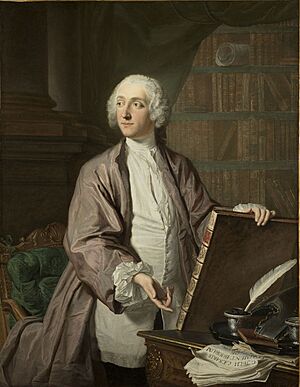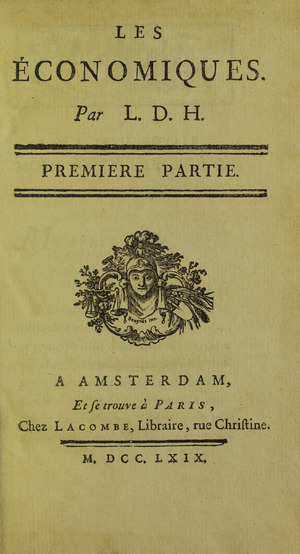Victor de Riqueti, marquis de Mirabeau facts for kids
Victor de Riqueti, Marquis de Mirabeau (born October 5, 1715, in Pertuis; died July 13, 1789, in Argenteuil) was an important French thinker. He was an economist who belonged to a group called the Physiocratic school. This group believed that a country's wealth came mainly from its land and agriculture.
He was the father of two famous sons: Honoré, Comte de Mirabeau and André Boniface Louis Riqueti de Mirabeau. People often called him the elder Mirabeau to tell him apart from his younger brother, Jean-Antoine Riqueti de Mirabeau.
Contents
Early Life and Army Career
Victor de Mirabeau had a very strict upbringing from his father. In 1728, he joined the army. He really enjoyed military campaigns and fighting. However, he never became more than a captain. This was because he couldn't get permission to buy his own regiment.
In 1737, his father passed away, and Victor inherited the family's property. For a few years until 1743, he enjoyed spending time with writers like Luc de Clapiers, marquis de Vauvenargues. But then he decided to get married. He wanted to marry for land and property, not just for money.
On April 21, 1743, he married Marie-Geneviève de Vassan. He married her without even seeing her first! In the same year, Mirabeau was honored. He was made a Knight of the Royal and Military Order of St. Louis.
Becoming an Economist
A big event changed Mirabeau's life and made him focus on economics. He got his hands on a special book manuscript by Richard Cantillon. This book was called Essai sur la nature du commerce en général. Mirabeau had it as early as 1740.
He started writing notes and comments on this book. These notes slowly grew into his own famous work. It was called L'Ami des hommes, which means "The Friend of Man."
While he was stationed in Bordeaux with the army, Mirabeau met Montesquieu. After leaving the army, Mirabeau wrote his first book, Testament Politique (1747). In this book, he argued that France would be more successful if its nobles returned to their old roles.
In 1749, his famous son, Honoré Gabriel, was born. In 1750, Mirabeau wrote another book. It was about the usefulness of local governments, called Utilité des états provinciaux. Some people even thought Montesquieu wrote it!
"The Friend of Man" and Physiocrats
In 1756, Mirabeau became known as an economist. He published his major work, L'Ami des hommes ou Traité de la population. This book is often linked to Quesnay. Quesnay was the founder of the Physiocrats, an economic school of thought. However, Mirabeau actually wrote his book before he even met Quesnay.
In 1760, he published Théorie de l'impot (Theory of Taxation). In this book, he strongly criticized the "farmers-general" of taxes. These were private individuals who collected taxes for the government. His strong words led to him being jailed for eight days. After that, he was sent away to his country estate at Bignon near Nemours.
At Bignon, the Physiocrats really took shape as a group. In 1765, Mirabeau bought a newspaper. It was called Journal de l'agriculture, du commerce, et des finances. This newspaper became the main way the Physiocrats shared their ideas.
Important leaders recognized him as a top economic thinker. These included Prince Leopold of Tuscany (who later became emperor) and Gustav III of Sweden. In 1772, Gustav III even gave him a special award, the Grand Cross of the Order of Vasa.
Later Life and Challenges
Mirabeau's marriage was not a happy one. He separated from his wife in 1762. He thought he had sent her away to the countryside. But in 1772, she suddenly came back to Paris. She started a legal case to officially separate from him. One of his own daughters had encouraged his wife to do this.
Mirabeau wanted to keep the case quiet. He was in a relationship with a Swiss lady, Mme de Pailly. But his wife kept fighting the case. Her first request was denied in 1777. However, she tried again and won in 1781. Even his son Honoré spoke in court to defend his father.
This long legal battle greatly affected Mirabeau's health and his money. He had to sell his estate at Bignon. He then rented a house in Argenteuil. He lived there quietly until he passed away.
His Brother, Jean Antoine
Mirabeau's younger brother, Jean Antoine Riquetti, was also important. He was known as the bailli and died in 1794. He served bravely in the navy. However, his rough manners made it hard for him to succeed at court. In 1763, he became the general of the galleys in Malta. In 1767, he returned to France. He helped his brother, the marquis, with his difficult legal problems.
Legacy
Victor de Mirabeau was often called "Friend of Man." This nickname came from his famous book, L'Ami des Hommes. He was also the first person to use the term "social science" in French, which he did in 1767.
Works
- L'ami des hommes : ou, Traité de la population (1759)
- Volume 1: online
- Volume 2: online
- Volume 4: online (1762)
- Volume 5: online
- Volume 7: online (1762)
- Théorie de l’impôt (1761), online
- Les économiques
- Philosophie rurale (ou, Économie générale et politique de l'agriculture, reduite à l'ordre immuable des loix physiques & morales, qui assurent la prospérité des empires) (1763)
- Volume 1 (Full text online)
- Volume 2 (Full text online)
- Volume 3: (Full text online)
- La science ou Les droits et les devoirs de l’homme (1774)
See also
 In Spanish: Victor Riquetti para niños
In Spanish: Victor Riquetti para niños
 | Sharif Bey |
 | Hale Woodruff |
 | Richmond Barthé |
 | Purvis Young |



